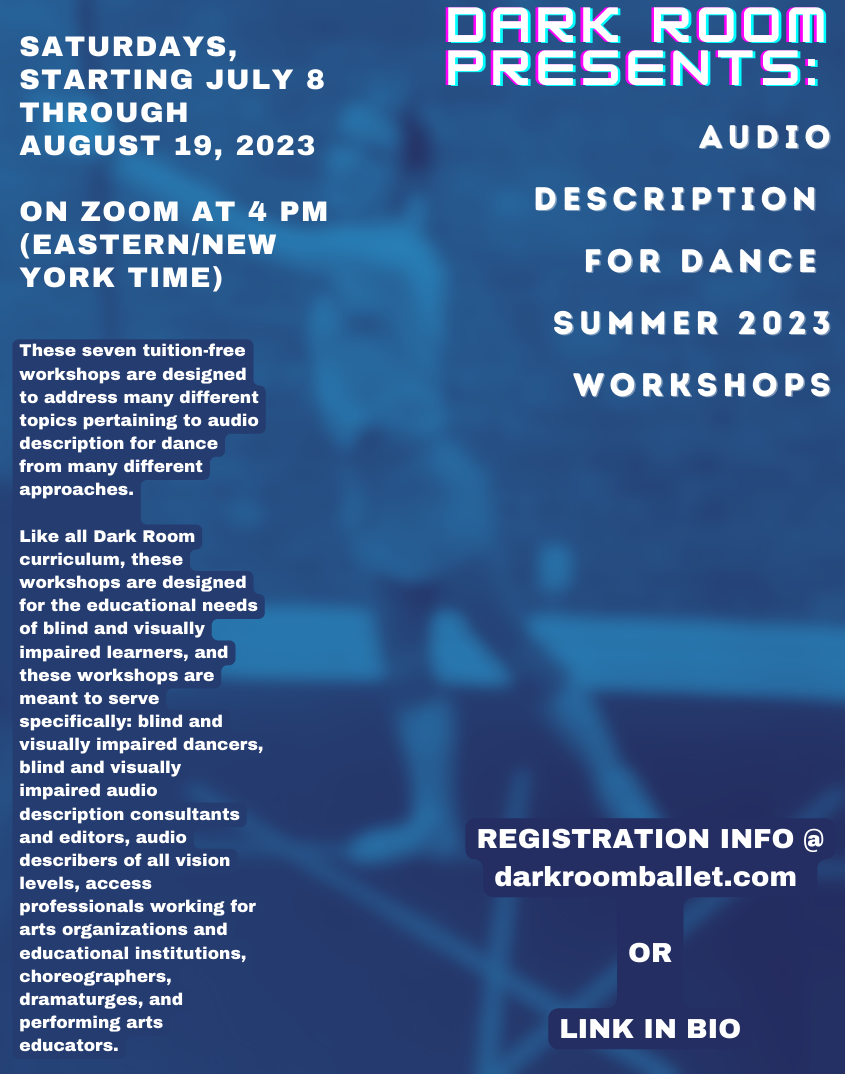- Saturday, July 8: Four Strategies to De-Center Sight in Audio Description for Dance
- Saturday, July 15: Experimentation in Vocal Tonality for Audio Description for Dance (past session)
- Saturday, July 22: Body Language, Movement Shorthand, and Mime for Blind Audiences (past session)
- Saturday, July 29: Narrative Components in Audio Description for Dance (past session)
- Saturday, August 5: Script Preparation Strategies for Audio Description for Dance: Multiple Pathways! (past session)
- Saturday, August 12: Yeah, But Was It Good? Learning How to Listen to Audio Description for Dance Critically
- Saturday, August 19: Three Traditional Ballet Variations Explored Through Pedagogical and Theatrical Audio Description (past session)
These seven tuition-free workshops are designed to address many different topics pertaining to audio description for dance from many different approaches.
Like all Dark Room curriculum, all of these workshops are designed for the educational needs of blind and visually impaired learners, and these workshops are meant to serve specifically: blind and visually impaired dancers, blind and visually impaired audio description consultants and editors, audio describers of all vision levels, access professionals working for arts organizations and educational institutions, choreographers, dramaturges, and performing arts educators.
Registration is now open! To register for any of these tuition-free workshops, please send an email to info@darkroomballet.com
New students who have never studied in the Dark Room before will need to fill out an intake form. Most audio description courses are very expensive, and almost none of them focus exclusively on dance in their subject matter, so please register at your earliest convenience!
About the instructor:
Krishna Washburn is the Artistic Director and sole teacher for all Dark Room courses. She teaches traditional blind dance technique at the introductory, open, and professional levels, dancer’s anatomy for blind and visually impaired learners (No Diagram Anatomy), and audio description for dance. She holds a M.Ed. from Hunter College and multiple certifications through the American College of Sports Medicine with special focus in biomechanics. She is the Co-Director, along with choreographer Heather Shaw, of Telephone, an educational documentary film that explores artistic philosophy pertaining to audio description and documenting the multiple artistic forms of audio description for dance. Krishna is one of very few blind educators working in the field of dance and audio description, but hopes that will change very soon.
WORKSHOP DETAILS:
NOTE: All workshops take place via Zoom beginning at 4 PM (Eastern/New York Time) and run approximately 2 hours; some may run longer depending on participation.
Saturday, July 8: Four Strategies to De-Center Sight in Audio Description for Dance
When developing audio description for dance, even for blind artists, there is an expectation that the audio describer will “say what is seen.” What if this approach isn’t adequate to express the artistic ideas of the dance? What are strategies that audio describers and dancers can reach for instead? In this workshop, students will learn four strategies to help break them out of the “say what you see” box, and also learn about a popular strategy that might be better off left on the shelf.
Saturday, July 15: Experimentation in Vocal Tonality for Audio Description for Dance
Most audio description used to support television and film is recorded with a neutral tone of voice. However, we here in the Dark Room propose that dance is a very different art form that deserves a different approach to audio description. Be ready to listen to some interesting examples of audio description, practice using the voice expressively, and pair sound and movement together in artistically effective ways.
Saturday, July 22: Body Language, Movement Shorthand, and Mime for Blind Audiences
Although there are common cultural assumptions about popular body language and movement shorthand, it’s important to remember that they are all learned and not universally known! We’re going to break down some body language assumptions, find ways to integrate effective audio description, and explore the wonderfully hilarious world of mime and exaggerated body language.
Saturday, July 29: Narrative Components in Audio Description for Dance
One of the greatest challenges for audio describers of dance is balancing movement description with essential narrative components. While some dance companies provide narrative information about dance in a synopsis before the performance, we here in the Dark Room argue that the synopsis is inadequate to help blind and visually impaired audiences truly immerse themselves in the art. Learn how to connect story and movement through examples and creation.
Saturday, August 5: Script Preparation Strategies for Audio Description for Dance: Multiple Pathways!
Where do audio description scripts come from? It depends! This workshop will discuss multiple approaches to getting started on an audio description script, depending on multiple factors: access to artists involved with the project, prior knowledge, type of audience, style of performance, timeframes, and so on and so forth. This is a great introduction to script writing for audio description novices, and a great opportunity for audio description fans to express themselves.
Saturday, August 12: Yeah, But Was It Good? Learning How to Listen to Audio Description for Dance Critically
Audio description for dance performances is still very rare, but that doesn’t mean that blind and visually impaired audiences should be satisfied when the audio description on offer is of low quality. Students are going to get to listen to many, many examples of audio description for dance, and talk about what works and what doesn’t work, and what we might change in order to improve it.
Saturday, August 19: Three Traditional Ballet Variations Explored Through Pedagogical and Theatrical Audio Description
Are you a blind or visually impaired dancer who needs an audition solo? Are you a blind or visually impaired ballet lover who would love a deep-dive into some traditional ballet dances? Are you an audio describer of traditional ballet performance who wants to learn multiple approaches to capturing the magic of ballet in language? If so, this workshop is for you! Learn solos from traditional ballet repertoire: La Fille Mal Gardee, The Nutcracker, and Giselle.
